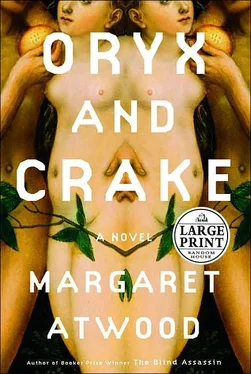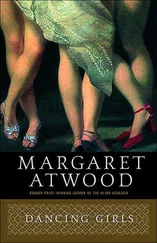When Snowman has finished he licks his fingers and wipes them on his sheet, and places the bones back in their leaf wrappings, ready to be returned to the sea. He’s told them Oryx wants that—she needs the bones of her children so she can make other children out of them. They’ve accepted this without question, like everything he says about Oryx. In reality it’s one of his smarter ploys: no sense leaving the scraps around on land, to attract rakunks and wolvogs and pigoons and other scavengers.
The people move closer, men and women both, gathering around, their green eyes luminescent in the semi-darkness, just like the rabbit: same jellyfish gene. Sitting all together like this, they smell like a crateful of citrus fruit—an added feature on the part of Crake, who’d thought those chemicals would ward off mosquitoes. Maybe he was right, because all the mosquitoes for miles around appear to be biting Snowman. He resists the urge to swat: his fresh blood only excites them. He shifts to the left so he’s more in the smoke of the torches.
“Snowman, tell us please about the deeds of Crake.”
A story is what they want, in exchange for every slaughtered fish. Well, I owe them, Snowman thinks. God of Bullshit, fail me not.
“What part would you like to hear tonight?” he says.
“In the beginning,” prompts a voice. They’re fond of repetition, they learn things by heart.
“In the beginning, there was chaos,” he says.
“Show us chaos, please, oh Snowman!”
“Show us a picture of chaos!”
They’d struggled with pictures, at first—flowers on beach-trash lotion bottles, fruits on juice cans. Is it real? No, it is not real. What is this not real? Not real can tell us about real. And so forth. But now they appear to have grasped the concept.
“Yes! Yes! A picture of chaos!” they urge.
Snowman has known this request would be made—all the stories begin with chaos—and so he’s ready for it. From behind his concrete-slab cache he brings out one of his finds—an orange plastic pail, faded to pink but otherwise undamaged. He tries not to imagine what has happened to the child who must once have owned it. “Bring some water,” he says, holding out the pail. There’s a scramble around the ring of torches: hands reach out, feet scamper off into the darkness.
“In the chaos, everything was mixed together,” he says. “There were too many people, and so the people were all mixed up with the dirt.” The pail comes back, sloshing, and is set down in the circle of light. He adds a handful of earth, stirs it with a stick. “There,” he says. “Chaos. You can’t drink it…”
“No!” A chorus.
“You can’t eat it…”
“No, you can’t eat it!” Laughter.
“You can’t swim in it, you can’t stand on it…”
“No! No!” They love this bit.
“The people in the chaos were full of chaos themselves, and the chaos made them do bad things. They were killing other people all the time. And they were eating up all the Children of Oryx, against the wishes of Oryx and Crake. Every day they were eating them up. They were killing them and killing them, and eating them and eating them. They ate them even when they weren’t hungry.”
Gasping here, widened eyes: it’s always a dramatic moment. Such wickedness! He continues: “And Oryx had only one desire—she wanted the people to be happy, and to be at peace, and to stop eating up her children. But the people couldn’t be happy, because of the chaos. And then Oryx said to Crake, Let us get rid of the chaos. And so Crake took the chaos, and he poured it away.” Snowman demonstrates, sloshing the water off to the side, then turns the pail upside down. “There. Empty. And this is how Crake did the Great Rearrangement and made the Great Emptiness. He cleared away the dirt, he cleared room…”
“For his children! For the Children of Crake!”
“Right. And for…”
“And for the Children of Oryx, as well!”
“Right,” says Snowman. Is there no end to his shameless inventions? He feels like crying.
“Crake made the Great Emptiness… ,” say the men.
“For us! For us!” say the women. It’s becoming a liturgy. “Oh, good, kind Crake!”
Their adulation of Crake enrages Snowman, though this adulation has been his own doing. The Crake they’re praising is his fabrication, a fabrication not unmixed with spite: Crake was against the notion of God, or of gods of any kind, and would surely be disgusted by the spectacle of his own gradual deification.
If he were here. But he’s not here, and it’s galling for Snowman to listen to all this misplaced sucking up. Why don’t they glorify Snowman instead? Good, kind Snowman, who deserves glorification more—much more—because who got them out, who got them here, who’s been watching over them all this time? Well, sort of watching. It sure as hell wasn’t Crake. Why can’t Snowman revise the mythology? Thank me, not him! Lick my ego instead!
But for now his bitterness must be swallowed. “Yes,” he says. “Good, kind Crake.” He twists his mouth into what he hopes is a gracious and benevolent smile.
At first he’d improvised, but now they’re demanding dogma: he would deviate from orthodoxy at his peril. He might not lose his life—these people aren’t violent or given to bloodthirsty acts of retribution, or not so far—but he’d lose his audience. They’d turn their backs on him, they’d wander away. He is Crake’s prophet now, whether he likes it or not; and the prophet of Oryx as well. That, or nothing. And he couldn’t stand to be nothing, to know himself to be nothing. He needs to be listened to, he needs to be heard. He needs at least the illusion of being understood.
“Oh Snowman, tell us about when Crake was born,” says one of the women. This is a new request. He isn’t ready for it, though he should have expected it: children are of great interest to these women. Careful, he tells himself. Once he provides a mother and a birth scene and an infant Crake for them, they’ll want the details. They’ll want to know when Crake cut his first tooth and spoke his first word and ate his first root, and other such banalities.
“Crake was never born,” says Snowman. “He came down out of the sky, like thunder. Now go away please, I’m tired.” He’ll add to this fable later. Maybe he’ll endow Crake with horns, and wings of fire, and allow him a tail for good measure.
After the Children of Crake have filed away, taking their torches with them, Snowman clambers up his tree and tries to sleep. All around him are noises: the slurping of the waves, insect chirpings and whirrings, bird whistles, amphibious croaks, the rustling of leaves. His ears deceive him: he thinks he can hear a jazz horn, and under that a rhythmic drumming, as if from a muffled nightclub. From somewhere farther along the shore comes a booming, bellowing sound: now what? He can’t think of any animal that makes such a noise. Perhaps it’s a crocodile, escaped from a defunct Cuban handbag farm and working its way north along the shore. That would be bad news for the kids in swimming. He listens again, but the sound doesn’t recur.
There’s a distant, peaceful murmur from the village: human voices. If you can call them human. As long as they don’t start singing. Their singing is unlike anything he ever heard in his vanished life: it’s beyond the human level, or below it. As if crystals are singing; but not that, either. More like ferns unscrolling—something old, carboniferous, but at the same time newborn, fragrant, verdant. It reduces him, forces too many unwanted emotions upon him. He feels excluded, as if from a party to which he will never be invited. All he’d have to do is step forward into the firelight and there’d be a ring of suddenly blank faces turned towards him. Silence would fall, as in tragic plays of long ago when the doomed protagonist made an entrance, enveloped in his cloak of contagious bad news. On some non-conscious level Snowman must serve as a reminder to these people, and not a pleasant one: he’s what they may have been once. I’m your past , he might intone. I’m your ancestor, come from the land of the dead. Now I’m lost, I can’t get back, I’m strande d here, I’m all alone. Let me in!
Читать дальше












